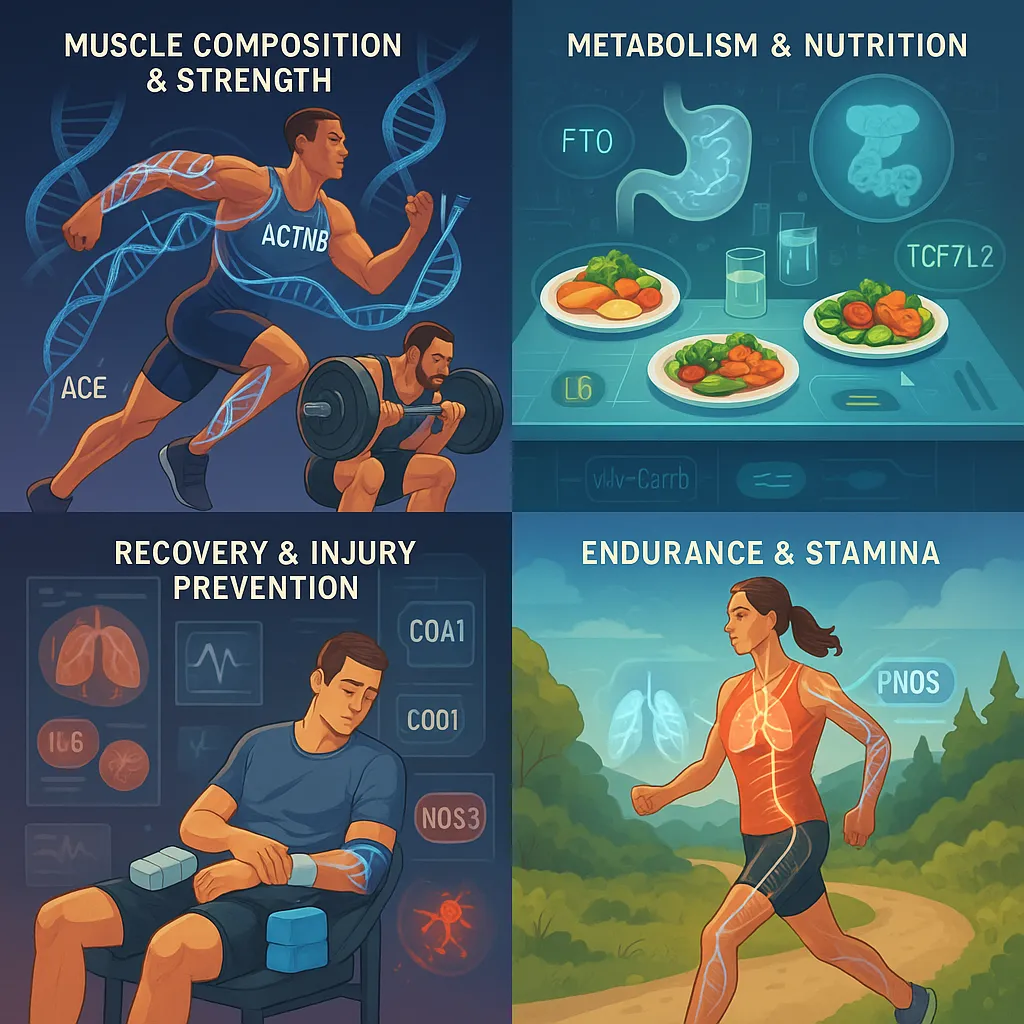
Professional athletes know how to optimize physical performance. It’s how they can breeze through marathons, while others excel at explosive lifts. Genetics play a key role—up to 50–80% of athletic performance can be traced to your DNA. At Elite Gene Labs, we combine your genetic blueprint with proven science to fine-tune how you train, recover, and fuel your body. By analyzing variants alongside broader polygenic models, we can tailor your workouts and nutrition to match your biology. Yet genetics alone isn’t destiny—non-genetic factors like training and diet still matter massively. Join us as we explore how understanding your genetics can help you achieve peak physical performance.
Table of Contents
The Role of Genetics in Physical Performance
Your genetic makeup plays a crucial role in determining your physical abilities and limitations. Factors such as muscle composition, metabolism, endurance, recovery, and susceptibility to injuries are all influenced by your genes. By analyzing your genetic profile, we can provide you with tailored recommendations to optimize your performance.

Key Areas Where Genetic Testing Can Help
1. Muscle Composition and Strength
Genetic testing can reveal variants in genes like ACTN3 and ACE, which are linked to muscle fiber composition and physical power output. For example, the ACTN3 R577X polymorphism affects the presence of alpha-actinin-3, a protein found in fast-twitch muscle fibers used during sprinting and power-based activities. Those with the “RR” genotype often have a natural advantage in explosive sports, while those with the “XX” variant may perform better in endurance settings.
By understanding your muscle fiber predisposition, you can structure your workouts to complement your genetic strengths—whether that means focusing on resistance training for hypertrophy and strength or incorporating more aerobic sessions to support stamina.
2. Metabolism and Nutrition
Your genetic makeup can impact how your body responds to macronutrients, food sensitivities, and micronutrient absorption. For instance, variations in the FTO gene are associated with higher hunger signals and an increased tendency to store fat. Meanwhile, polymorphisms in TCF7L2 may influence insulin sensitivity and blood sugar regulation.
Through DNA analysis, genetic testing can help determine whether you’re more likely to benefit from a low-carb, Mediterranean, or high-protein diet, and identify predispositions to vitamin D or B12 deficiencies. These insights help you fuel your body more efficiently, support lean muscle gain, and maintain energy levels during training.
3. Recovery and Injury Prevention
Genes such as IL6, COL1A1, and TNF play roles in inflammation, collagen synthesis, and injury risk. A higher expression of inflammatory markers or reduced collagen production may increase your susceptibility to tendon injuries, joint strain, or slower healing.
With this information, you can adjust your training volume, integrate more rest days, or focus on joint-supporting activities like mobility work and flexibility training. Genetic insights also guide supplementation—for instance, incorporating omega-3s, curcumin, or collagen peptides—to reduce inflammation and support recovery.
4. Endurance and Stamina
Your aerobic potential is largely influenced by your VO₂ max, mitochondrial efficiency, and lactate threshold—factors that have genetic underpinnings. Variants in genes like PPARGC1A (which affects mitochondrial biogenesis) and NOS3 (which regulates blood flow and oxygen delivery) can inform your endurance capabilities.
Conclusion
Most people assume that better results come from pushing harder—but sometimes, the real edge comes from knowing how your body is wired. Genetic testing gives you that insight. It shows you where your strengths lie, what your body needs more of, and how to avoid the things that slow you down.
At Elite Gene Labs, it’s not about selling shortcuts—it’s about giving you tools that help you train, recover, and perform in ways that actually match who you are. Are you chasing a personal best, improving your athletic performance or just want to feel more in control of your health? This kind of testing can give you clarity and direction you won’t get from trial and error alone.
In the end, better performance starts with better understanding.
Frequently Asked Questions
How can genetic testing improve my physical performance?
Genetic testing analyzes specific markers in your DNA related to muscle function, metabolism, recovery, and endurance. This information can guide personalized exercise, nutrition, and recovery strategies—allowing you to train smarter, prevent injury, and perform at your best.
What kind of genes are tested for athletic performance?
Genes commonly analyzed include:
ACTN3 and ACE (muscle power and endurance),
FTO and TCF7L2 (metabolism and weight management),
IL6 and TNF (inflammation and recovery),
PPARGC1A and NOS3 (aerobic capacity and blood flow).
Each of these influences how your body responds to training, food, and stress.
Is genetic testing only for elite athletes?
Not at all. It doesn’t you’re a professional athlete, weekend warrior, or just beginning a fitness journey. Genetic insights can help you make more informed decisions about your health and performance goals.
How accurate is the genetic information?
The markers tested are backed by peer-reviewed scientific research and interpreted using validated data models. While genetics is just one part of the performance equation, it provides a highly reliable baseline for tailoring your approach.
Can genetic testing help me avoid injuries?
Yes. Certain genes influence your likelihood of injury or how well you recover from physical stress. With this knowledge, you can adapt your training load, focus on preventative care, and choose recovery strategies that suit your body best.

